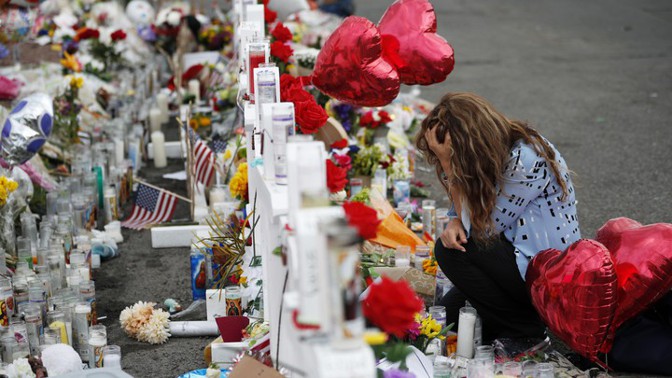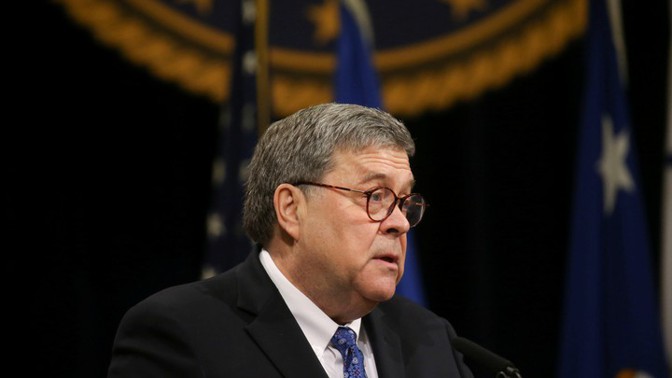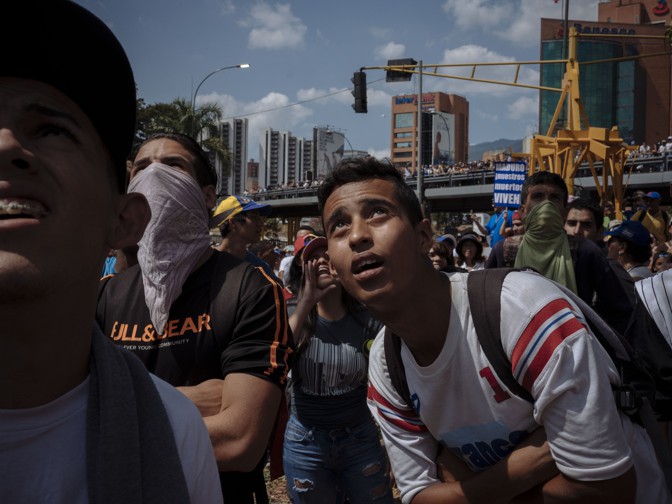It’s Thursday, February 27. In today’s newsletter: What Bernie Sanders’s 2020 rivals learned from Hillary Clinton. Plus: Venezuela is the eerie endgame of modern politics, Anne Applebaum writes.
*
« TODAY IN POLITICS »

(John Locher / AP)
Bernie’s rivals have found an opening to attack him from the left.
To his detractors, Bernie Sanders can at best sound like a broken record. His core 2020 message is largely consistent with the progressive message he’s been hammering at for decades. But on issues around gun violence, Sanders hasn’t always been stalwartly progressive. He opposed certain gun restrictions in the ‘90s, and though his views have “evolved” (to use the preferred parlance of wishy washy DC politicos), his record on guns may be among his biggest vulnerabilities.
Candidates like Michael Bloomberg eager to go after Bernie on guns are borrowing from Hillary Clinton’s 2016 playbook, my colleague Russell Berman points out:
The campaign saw the gun issue as potent against Sanders, a former official told me, because it resonated most with three constituencies crucial to Democrats: voters of color, suburban women, and young people. Yet because Clinton never truly feared losing the nomination, she stopped short of maximizing the impact of her attack and didn’t run negative television ads on his gun record. “We raised the gun issue in order to put some chum in the water,” the second former campaign official said, speaking on the condition of anonymity in order to speak candidly. The strategy “was much more about giving something for the elites and the press to talk about than it was about informing actual primary voters.”
All the while, gun violence in America has grimly, devastatingly plodded along. Just yesterday, five people were shot and killed at the Molson Coors brewery in Milwaukee. America in 2019 saw more mass shootings than any other year on record. Two of the three deadliest occurred in the span of a single day.
Gun violence has become personal for many people in a way that it wasn’t before—a shift the party can try to capitalize on, my colleague Elaine Godfrey writes.
Guns have “to be on par with health care and with quality-of-life issues,” Dan Sena, a Democratic strategist who was the executive director of the Democratic Congressional Campaign Committee during last year’s midterms, told me in an interview. And the growing intrusion of mass gun violence into daily life could be what upgrades the issue to a top concern for voters—a shift that Democrats could try to capitalize on in the same way they seized on voters’ worries about the fate of Obamacare and their own creeping health-care costs last year. The 2020 election, Sena said, “could be the first time you actually see” gun violence take center stage as the party’s go-to election message.
But can Democrats successfully center any part of the 2020 race around guns?
—Saahil Desai
*
« IDEAS AND ARGUMENTS »

(Leah Millis / Reuters)
1. “Critics may laugh and shake their heads, but the simple fact is that these people see themselves as stalwart defenders of the Constitution.”
While Attorney General Bill Barr’s critics accuse him of bending law enforcement to Trump’s political whims, but what if Barr’s efforts are working toward depoliticizing the Justice Department? That’s the argument of this former associate director for regulatory reform at the White House Council on Environmental Quality.
2. “The GOP now exists to further the personal desires and wealth of one man … It is no longer a party of ideas, but a party of idolaters.”
Trump’s takeover of the Republican Party is a symptom of problem America’s institutions face, three founders of the anti-Trump activist group called the Lincoln Project argue: “Defeating him is only the beginning of a national reformation,” they say.
3. “The purity test starts at the top.”
National Security Adviser Robert O’Brien’s recent culling of the National Security Council may be cloaked in the language of making a sprawling bureaucracy more efficient. But really the move functions as a purge of disloyal staffers to Trump, this former Pentagon speechwriter argues.
*
« EVENING READ »

(Emin Ozmen / Magnum Photos)
What Happened in Venezuela
“Venezuela is not an idea,” Anne Applebaum writes. “It is a real place, full of real people.” And the current state of the country represents the eerie endgame of modern politics:
Trump is not the only world leader to cite Venezuela for self-serving ends. Regardless of what actually happens there, Venezuela—especially when it was run by Maduro’s predecessor, the late Hugo Chávez—has long been a symbolic cause for the Marxist left as well … Jeremy Corbyn, the far-left leader of the British Labour Party, was photographed with Chávez and has described his regime in Venezuela as an “inspiration to all of us fighting back against austerity and neoliberal economics.”
Chávez’s rhetoric also helped inspire the Spanish Marxist Pablo Iglesias to create Podemos, Spain’s far-left party. Iglesias has long been suspected of taking Venezuelan money, though he denies it. Even now, the idea of Venezuela inspires defensiveness and anger wherever dedicated Marxists still gather, whether they are Code Pink activists vowing to “protect” the Venezuelan embassy in Washington from the Venezuelan opposition or French Marxists who refuse to call Maduro a dictator.
*
Today’s newsletter was written Saahil Desai, an editor on the Politics desk, and Christian Paz, a politics fellow. It was edited by Shan Wang, who oversees newsletters.
You can reply directly to this newsletter with questions or comments, or send a note to politicsdaily@theatlantic.com.
Your support makes our journalism possible. Subscribe here.
from The Atlantic https://ift.tt/32FANRy






0 comments:
Post a Comment